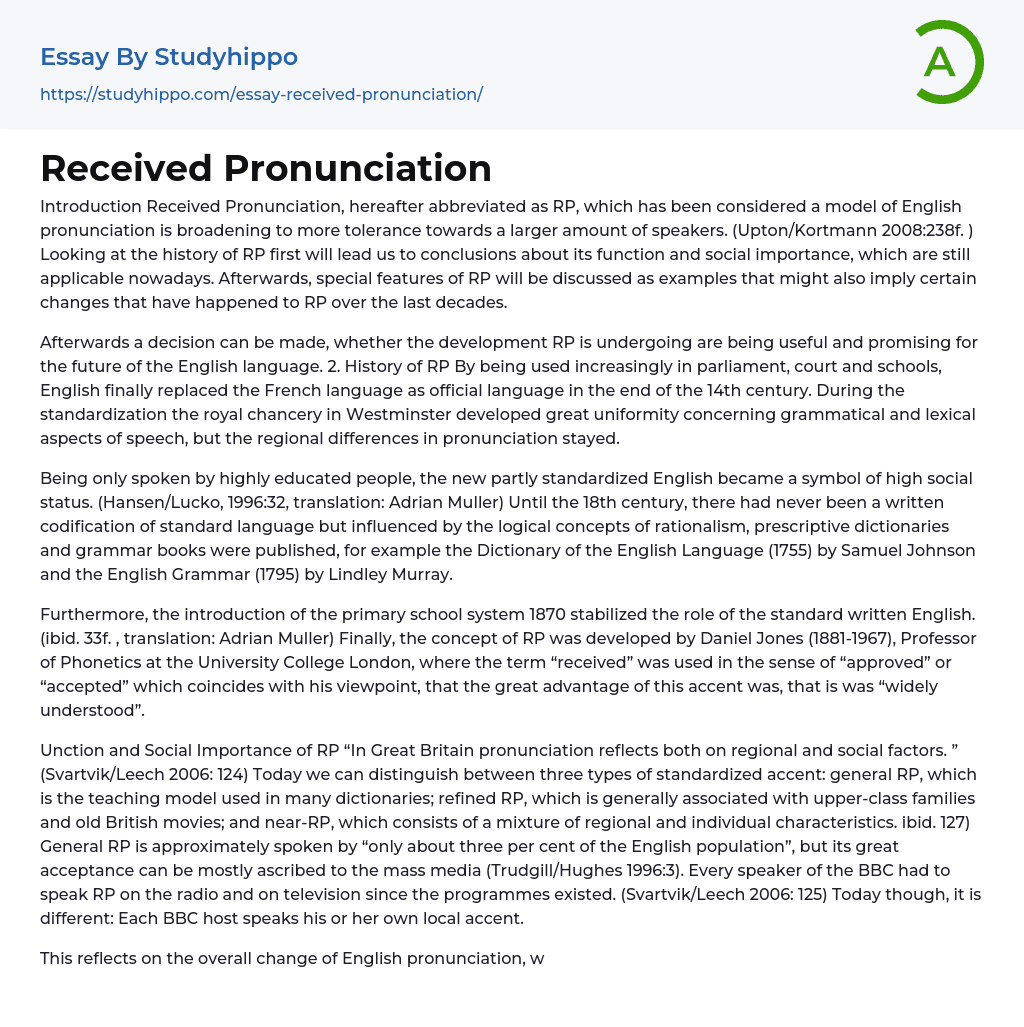Introduction Received Pronunciation, hereafter abbreviated as RP, which has been considered a model of English pronunciation is broadening to more tolerance towards a larger amount of speakers. (Upton/Kortmann 2008:238f. ) Looking at the history of RP first will lead us to conclusions about its function and social importance, which are still applicable nowadays. Afterwards, special features of RP will be discussed as examples that might also imply certain changes that have happened to RP over the last decades.
Afterwards a decision can be made, whether the development RP is undergoing are being useful and promising for the future of the English language. 2. History of RP By being used increasingly in parliament, court and schools, English finally replaced the French language as official language in the end of the 14th century. During the standardization the royal chancery in Westminster developed
...great uniformity concerning grammatical and lexical aspects of speech, but the regional differences in pronunciation stayed.
Being only spoken by highly educated people, the new partly standardized English became a symbol of high social status. (Hansen/Lucko, 1996:32, translation: Adrian Muller) Until the 18th century, there had never been a written codification of standard language but influenced by the logical concepts of rationalism, prescriptive dictionaries and grammar books were published, for example the Dictionary of the English Language (1755) by Samuel Johnson and the English Grammar (1795) by Lindley Murray.
Furthermore, the introduction of the primary school system 1870 stabilized the role of the standard written English. (ibid. 33f. , translation: Adrian Muller) Finally, the concept of RP was developed by Daniel Jones (1881-1967), Professor of Phonetics at the University Colleg
London, where the term “received” was used in the sense of “approved” or “accepted” which coincides with his viewpoint, that the great advantage of this accent was, that is was “widely understood”.
Unction and Social Importance of RP “In Great Britain pronunciation reflects both on regional and social factors. ” (Svartvik/Leech 2006: 124) Today we can distinguish between three types of standardized accent: general RP, which is the teaching model used in many dictionaries; refined RP, which is generally associated with upper-class families and old British movies; and near-RP, which consists of a mixture of regional and individual characteristics. ibid. 127) General RP is approximately spoken by “only about three per cent of the English population”, but its great acceptance can be mostly ascribed to the mass media (Trudgill/Hughes 1996:3). Every speaker of the BBC had to speak RP on the radio and on television since the programmes existed. (Svartvik/Leech 2006: 125) Today though, it is different: Each BBC host speaks his or her own local accent.
This reflects on the overall change of English pronunciation, which is also visible when people moving within the country adapt new accents at their new workplaces. As mentioned before, speakers of RP are historically connected with a higher social status and even nowadays “research has shown that RP has a high rating as being pleasing, articulate and prestigious”. Apart from being widely understood, RP also constitutes well-known norms to which other varieties such as Cockney and Estuary English can be compared for reference. Melcher/Shaw, 2003:45) Especially for teaching English it is quite useful to talk about varieties of a language, as it encourages a reflective behaviour
towards language. Considering these advantages, the logical conclusion is to use RP as a model for foreign language teaching, which is apparently the case because it is “the kind of English that foreigners want to learn”. Special Features of RP Unlike in General American, Scottish and Irish accents, no /r/-sound follows a vowel, that means that for example the word car is pronounced.
With mass media like television offering a broad variety of newsreaders, actors and other people who speak their own accents, people get used to understand these accents more easily and their acceptance also raises. RP will probably remain very important, as all the dictionaries, text and grammar books still use RP as a model and especially in foreign language learning an immediate change would not be possible. Although, it is very likely that some popular accents might even be used in the classroom to make students aware of different pronunciations, the stability of RP as a reference for pronunciation is essential.
- Academia essays
- Higher Education essays
- Language Learning essays
- Studying Business essays
- Education System essays
- Study essays
- First Day of School essays
- Scholarship essays
- Pedagogy essays
- Curriculum essays
- Coursework essays
- Studying Abroad essays
- Philosophy of Education essays
- Purpose of Education essays
- Brainstorming essays
- Educational Goals essays
- Importance Of College Education essays
- Brown V Board of Education essays
- The Importance Of Higher Education essays
- Online Education Vs Traditional Education essays
- Academic And Career Goals essays
- Academic Integrity essays
- Brown Vs Board Of Education essays
- Distance learning essays
- Technology in Education essays
- Vocabulary essays
- Writing Experience essays
- Importance of Education essays
- Early Childhood Education essays
- Academic Degree essays
- Academic Dishonesty essays
- School Uniform essays
- Academic writing essays
- Cheating essays
- Bachelor's Degree essays
- MBA essays
- College Life essays
- Grade essays
- Diploma essays
- Phonology essays
- Sentence essays
- Filipino Language essays
- Pragmatics essays
- Millennium Development Goals essays
- History Of Education essays
- Graduate School essays
- Middle School essays
- School essays
- Special Education essays
- University essays




